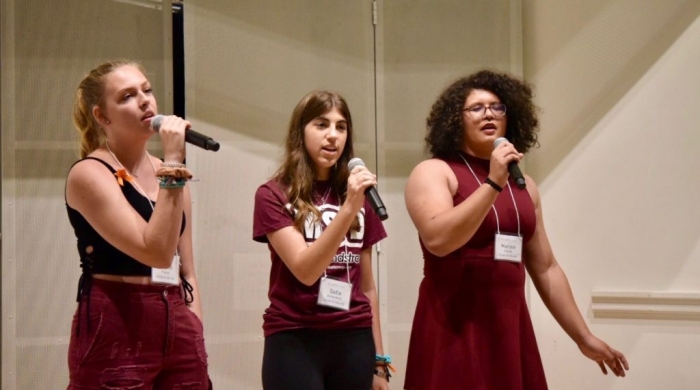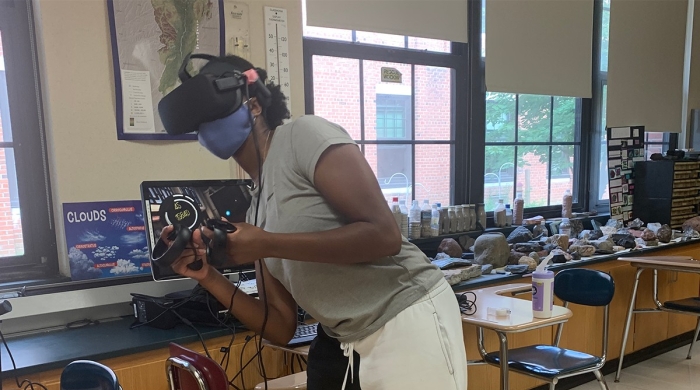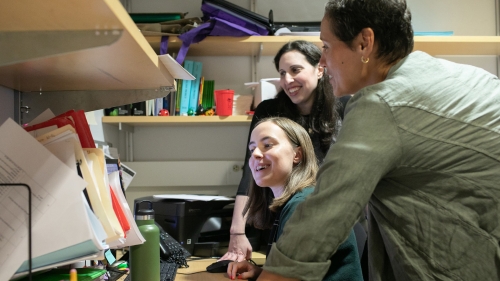DE-CRUIT is a New York City-based trauma treatment program that allows veterans to re-conceptualize their world through Shakespeare’s verse, leveraging the subject matter as well as classical acting techniques as psychophysiological therapy.
As lead scientist and co-founder of DE-CRUIT, Alisha Ali, associate professor in NYU Steinhardt’s Department of Applied Psychology, uses her expertise to oversee the program’s evaluation and integrate cognitive processing and narrative therapy components.
Started by US Army veteran Stephan Wolfert, DE-CRUIT evolved out of Wolfert’s own experiences with post-traumatic stress disorder (PTSD).
“For years, Stephan was highly successful in the military before undergoing a traumatic event,” says Ali. “After being discharged, he dealt with his trauma in unhealthy ways, until he stumbled upon a performance of Shakespeare’s Richard III. Hearing the winter of discontent speech, he saw himself in that play and immersed himself in this world as a means of better healing.”
Now, hundreds of veterans across the nation have participated in DE-CRUIT as part of their own journey. In this eight-week program, veterans begin their group sessions – either online, at NYU Steinhardt's CREATE Lab, or at the Bronx VA hospital – reading segments of Shakespeare’s works, which often carry themes of war, conflict, trauma, and other universal sentiments.
“The veterans see themselves reflected in this precise language from long ago that captures what they lived,” says Ali. “It’s the same suffering back then as it is now, and they can reappropriate these texts as a way to understand and process their own experiences.”
Shakespeare’s verse is set in iambic pentameter, a rhythm that emulates the human heartbeat. The recitation, along with the grounding and breathing techniques the veterans learn from DE-CRUIT’s classical theatre training, serves to de-escalate their trauma response. Similarly, pivoting the head from side to side while reciting to a large audience stimulates the vagus nerve – another common trauma treatment therapy and a performance practice that was common in Shakespeare’s time.
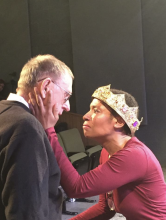
DE-CRUIT’s ongoing research has demonstrated significant decreases in PTSD and depression, as well as increased self-efficacy.
“The data we have collected on heart rate variability is some of the strongest of all – integrating a daily breathing practice based on the recitation of Shakespearean verse helps these veterans reregulate their responses to trauma,” says Ali.
After studying Shakespearean texts, participants then create a personal, first-hand monologue about their trauma and the event that has affected them the most. Monologues are then handed off to other veterans to perform for the group.
“Seeing their trauma in their own words but performed by someone else creates an aesthetic distance, allowing them to remove blame and forgive themselves, making room for healing,” says Ali.
The final stage of DE-CRUIT is the communalization of trauma, in which veterans invite an audience of family and friends to see them perform their own monologue, as well as an associated Shakespearean one. Built on the indigenous practice of storytelling to welcome warriors back into the tribe, this process serves to help integrate veterans back into the civilian world.
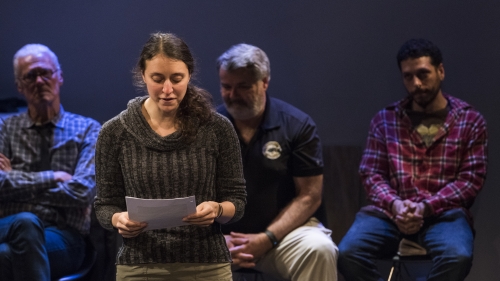
“DE-CRUIT is a perfect storm of specific aspects of trauma therapy that join together in a comprehensive program,” says Michelle Jeffers, a PhD student in Steinhardt’s Counseling Psychology program who works closely with Ali on her research with veterans. “Shakespeare is full of military connections, and the rhythm and flow of the words help with processing emotions. Being able to translate your story in a structured way in a safe space is challenging but beneficial, and it helps to experience things with other people who know what you’ve been through.”
Jeffers and Ali are conducting further work to study the efficacy of the DE-CRUIT program to replicate it elsewhere and for different participants.
“We’re going to conduct interviews with eight recent DE-CRUIT participants who have completed their final monologue presentations,” says Jeffers. “We want to ask the right questions to hone in on what makes DE-CRUIT work so well for them. By finding common themes, we can put out into the world what about this program works and better understand how to translate that success for other populations who’ve experienced trauma.”
DE-CRUIT’s research has been funded by the National Endowment for the Arts, the American Psychological Association, the Laurie M. Tisch Illumination Fund, the Humanities Council of New York, and the Creative Forces Military Healing Arts Network.
One of their latest grants is from the National Endowment for Humanities to adapt the DE-CRUIT model for use with previously incarcerated veterans.
Related Articles
After Trauma, High School Students Find Healing and Comfort in the Creative Arts
After a traumatic experience, healing can be a long road for young survivors. For high school students exposed to trauma, finding community is an important part of working through pain.
Virtual Reality Boxing Effective in Reducing Stress, Improving Cognitive Function in Adolescents
An NYU Steinhardt researcher studied the impact BOXVR on the Oculus Rift had on teens’ stress and anxiety levels, cognitive function, and enjoyment of exercise.
Bringing the Voices of the Incarcerated into the Limelight
NYU Steinhardt alum creates a groundbreaking prison arts performance with help from the Educational Theatre program's Verbatim Performance Lab and students.

